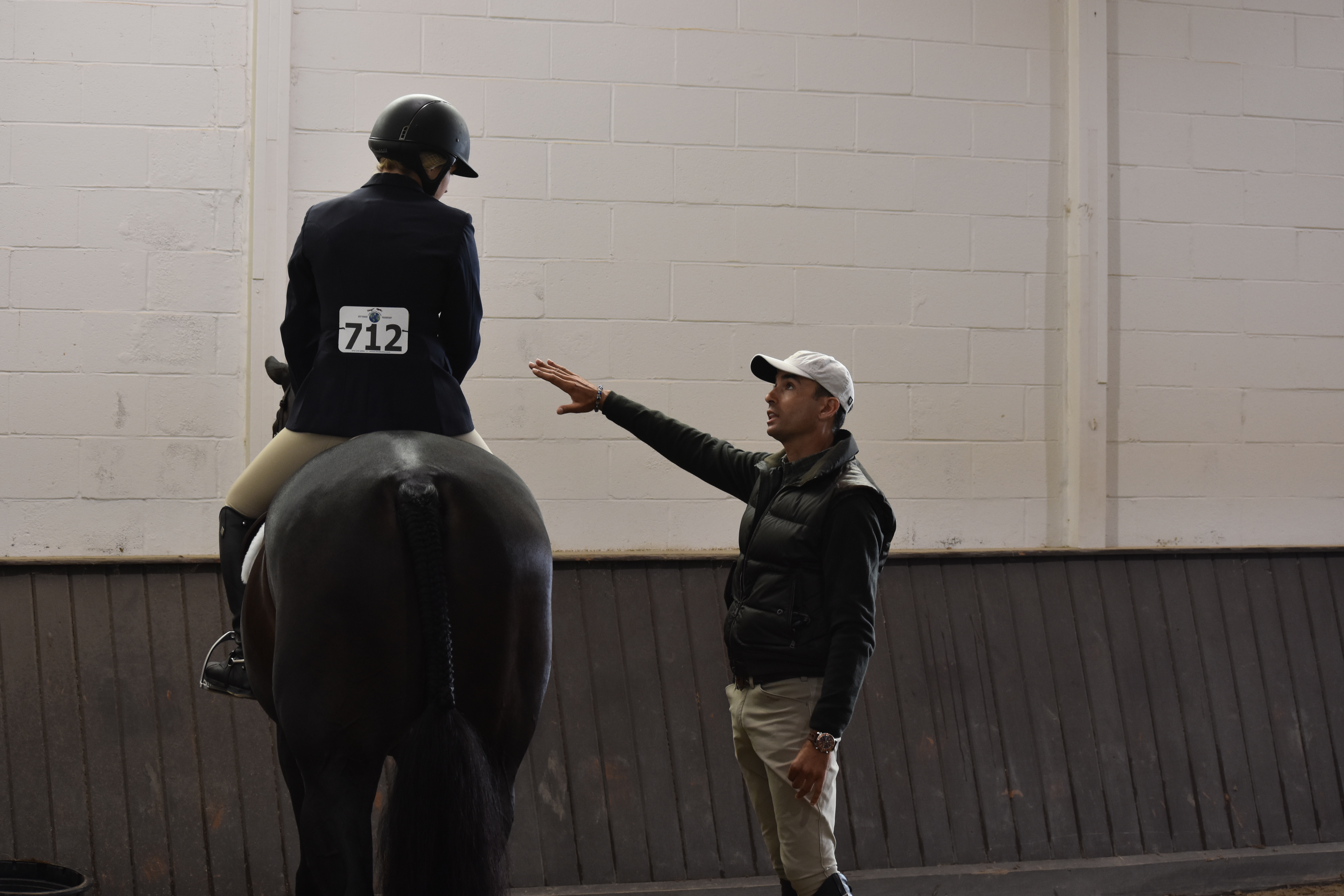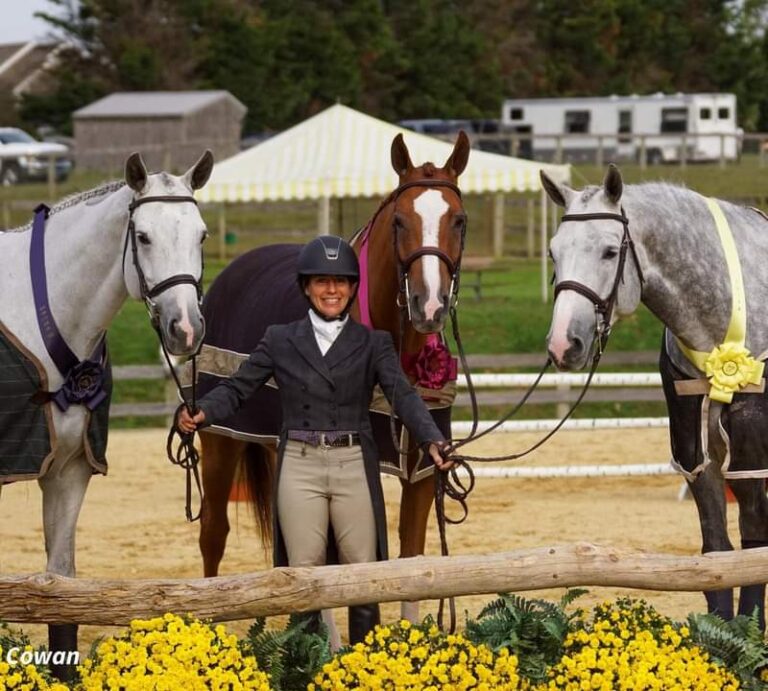
When Andre Dignelli was 6 years old, his older brothers convinced his parents to move to suburban New York, where they could keep horses in the back yard. Soon Andre was riding a moonblind Shetland pony named Sheena. One pony led to another, and a spectacular horse-sport career was born.
As a working student riding with Judy Richter, Andre was the dark-horse winner of the 1985 U.S. Equestrian Team Show Jumping Talent Search Final. By 1987, he joined her at Coker Farm. By 1991, he had trained his first national equitation champion, Peter Lutz. That year, he also won a team bronze medal at the Pan Am Games in Cuba and was the leading hunter rider at the National Horse Show. “After that, I just believed that anything was possible,” he said.
In 1994, Andre and his brother Michael bought Heritage Farm in New York and turned it into a state-of-the-art facility. Over the last decade, Andre has produced an impressive roster of medal-winning Big Eq riders, including Lillie Keenan, winner of the 2011 USHJA International Hunter Derby Championship and the 2013 ASPCA Maclay National Championship. He has also worked closely with Tori Colvin, Reed Kessler, Kirsten Coe and Kent Farrington.
He lives in North Salem, New York with his partner of 12 years, Ramon Roman.
PH: Was it hard to be a working-class kid breaking into such an expensive sport?
AD: We came from a working-class family. What we were lacking in money we made up for in love and support. I viewed the kids who had more as being a real opportunity, even when I was a kid. They had fancy horses and often extra horses and I got to ride them and help train.
I also think that being around these kids was the start of my American Dream. I would see them drive up to the barn in their BMWs and I would say to myself, “That’s not just for them. That’s for me, too.” I wanted to have it all. Live in the big house on the hill and have a big stable and have top horses.
PH: To what do you attribute your success?
AD: The real reason is that I found something I love doing. It never really felt like work. Because of that love I was willing to work 24/7 to do it. It’s no secret that I have a real work ethic and a vision and I am very organized. But it started from a love of horses and love of owning a farm and teaching. I never really wasted a day worrying about how I was going to get here or what I was doing. I knew what I was doing with my life.
Also, I have a very even temperament. I am very steady in the best of times and in the worst of times.
PH: How do you feel about winning? About losing?
AD: I realized at an early age that life is a competition. I think my success has been because I really have a burning desire to win. Without the competition part, it would be hard to get out of bed in the morning.
That said, I am also a good sport. I realize there are a lot of variables out of our control. If you approach it like you will give every day 100 percent, you have to be OK with the days it doesn’t go your way. I like to think I am a good competitor; I love to win. I can also appreciate when someone does it better. That makes me come home and reevaluate my program and work harder. It makes the winning sweeter.

PH: What would you like to change about the hunter/jumper industry?
AD: I wish this industry was less expensive and more people could experience it. The numbers prohibit people from getting involved. The problem is getting worse not better. The more you make it exclusive, the bigger risk you have of it becoming extinct. My fear is this industry is going to price itself out of people’s lives.
PH: What have you learned along the way?
AD: When running a large stable, there are many sleepless nights with a horse lame or sick or not going particularly well. And I would think, You are not going to make it. I had to accept that I was never going to have it when every horse was perfect every day. And probably the same with the customers. When we go to a horse show, there will always be some of my riders who are not having the best day.
PH: What is one of the most important things you have learned about yourself?
AD: I have learned that I am strong. After all these years, I am thick-skinned.
PH: What is the most important trait in a trainer?
AD: One of the reasons I have been successful is that I care. To be a good teacher you have to have a real relationship with your students. I have developed a real relationship with the people I have taught. They have to know that you are there for them 24/7 and are willing to do whatever it takes to make it happen.
PH: Do you consider yourself a role model for your students?
AD: This is how I carry myself when I come to the barn—cleaned and pressed, on time with a real energy and focus. I don’t have to work hard at clean living: I don’t drink, don’t smoke and I go to the gym. I have an obligation to be a role model for these kids. I understand what that role is and I don’t take that lightly. It’s important that they see me when the chips are down—that I act professionally because I expect the same from them. I want to be more than a good trainer, I want to be a good person.
PH: How do you balance students’ expectations with reality?
AD: People need to identify where they are: Am I in this for the sport? Am I in this for fun? Or am I in this for somewhere in between? Sometimes a weekend warrior thinks they are in it for the sport, but you are not going to win riding a day a week.
I am good if you want to be all in. I am good if you want to ride casually. Let’s identify where you are in this spectrum and follow along. But I think sometimes people are not that honest with themselves. I don’t think anyone gets successful without putting in the 10,000 hours. We are kidding ourselves if we think it is about buying the best horse. That won’t make up for the time and effort.
PH: Did your riding accident in 2015 affect your perspective?
AD: The accident was life-changing. I was on top of the world and we’d won the USET final on Sunday. On Tuesday, it was a beautiful day and I was riding a horse, he spun me off and I broke my femur in three places. I thought, Wow, life can change in an instant.
It reminded me again that you can’t take things for granted. I missed Medal Finals for the first time in my career. The outpouring of support was overwhelming. It was a moment when you are down and out and you think everyone will forget about you and canter over top of you. It was comforting to see how much love and support I received.
My fall did not appear to be much, and yet I was busted. I made a decision that I was not going to let this change my life. I went to Washington 10 days after the accident in a wheelchair and then I went to Europe on crutches. I was not letting this change my life one bit. I got on a horse three months to the day from my fall; I was still walking with a limp. You know you are pushing the envelope, but you want to get back to who you are, the routine. But, for sure, there was definitely a fear of falling off.
PH: What has been the best moment of your life?
AD: I have had so many. The quality of my life has been a blessing to me. Some days I just have to say, “Is this real?” When I am at those big events and those big moments happen, I get choked up. It still feels so important to me.
The best moment for me was winning the USEF final personally at the age of 18. It changed the course of my career. That confidence has stayed with me my whole life.

PH: What do you think is the best part of your job?
AD: I’ve helped many people for many different reasons. Some are freaky talented. Some are hard workers. Some are just great people. Everyone brought different things to the sport.
One of the most gratifying things is that when it is over, you like to think deep down that they get it. When you get a notecard from them or a call, and they tell you the role you’ve played in their lives—you realize that was what all this is about. It is a full-circle moment.
At Christmas in 2015, I was a little down after breaking my leg. I received a very special gift and handwritten card from [Olympian] Kent Farrington. He said, “I wish I was writing this while #1 in the world. I am currently #2. But I can’t thank you enough for everything you did for me.” These types of gestures overwhelm me.
PH: What advice would you give to young professionals?
AD: Make sure you know how to do all of it. Braid, drive the truck, feed the horse, body-clip. It’s more than getting a leg up on the horse. Make sure you can talk to the parents through the good times and the bad times.
One of the best life lessons I learned from Judy Richter early on: It has to run like a business. A lot of people run from show to show and they lose their shirts. You’ve got to watch the costs. If you don’t pay real attention to the numbers, you could find yourself out on the street.
PH: What do you regret?
AD: Honestly, I have no regrets. This sounds crazy. I am from the Oprah generation and I grew up coming home from school and that show was on TV. I have “lived my best life” for as long as I can remember. I put my best foot forward every day. And I guess my life is what it is. I have given it my all.
This article was originally published in the August 2017 issue of Practical Horseman.











